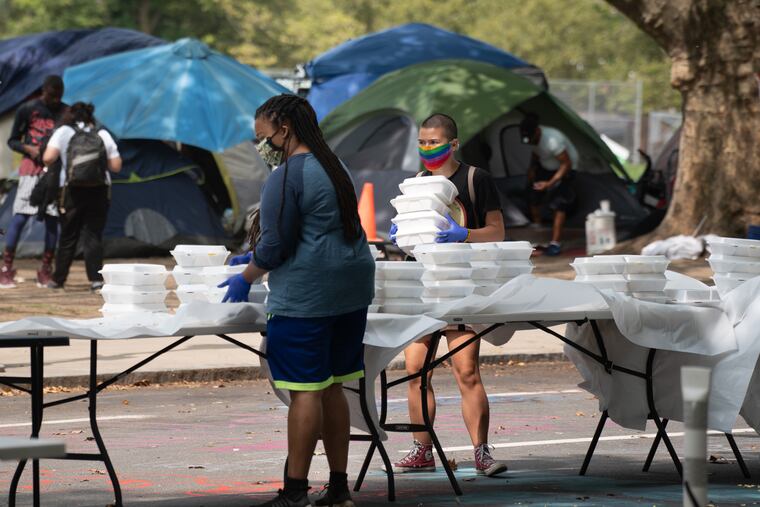I live by the Parkway homeless encampment and see it offering public services, not nuisance | Opinion
When I went to the encampment to talk to its residents, I learned how they were thriving in community.

The encampment started just a couple of days after I, alongside other Philadelphians, joined our collective voices in protest at one of the largest-ever gatherings of people in defense of Black lives like mine. I was so proud of the movement. I was proud that organizers, advocates, and community members banded together to fight for real, systemic change.
Then I was disappointed, though not surprised, to see the almost immediate reaction to the encampment from leaders of the Logan Square Neighborhood Association. I read their vague statements in various publications claiming that individuals living at the encampment were damaging residents' quality of life without offering concrete evidence to show that this is happening regularly, or that encampment residents were consistently involved.
» READ MORE: After deadline passes for homeless encampments to clear out, city won’t say what’s next on Parkway and at PHA
I looked around to see some of the supposed “detrimental effects” that Camp JTD had on the surrounding neighborhood. I didn’t notice any differences. No extra trash or syringes, and not a single person at the encampment has done anything to make me feel unsafe. I live in the neighborhood and have never seen a discarded syringe on the ground.
Back in June, I wrote several messages to the Logan Square Neighborhood Association. I did not receive a response. I’ve wondered if my observations were not taken seriously, because they did not fit the association’s preferred narratives about Black people and people experiencing homelessness.
But when I went to the encampment to talk to its residents, I learned how they were thriving in community. I learned that thanks to the encampment, they ate meals regularly, were getting their immediate needs taken care of, were being treated with dignity and respect, and felt that because people were fighting for them, that they had a chance to see true housing justice.
So why are some neighborhood leaders in Logan Square ignoring those benefits? Why do they see the encampment as such a threat to their way of life? Why is the city looking to remove encampments in the middle of a pandemic, despite CDC guidance that says that is harmful? And the city knows it is potentially harmful — it evicted a smaller encampment back in March and residents who were sent to shelters were exposed to a COVID-19 outbreak.
» READ MORE: How Philly’s summer of protests revitalized the affordable housing movement
There’s a long history of those with power doing everything they can to keep those without power from accessing it. This is why white parents fought so hard against integration in the South — but also in liberal cities like Philadelphia. This is why Black men, women, and children are stopped by police at such high rates that are not explained by a proportionate difference in crime rates. This is why, again, my Black life and the Black and brown lives of the folks in the encampments seem to matter less to those in power. And this is not the first time in recent memory that the city has fought to push people experiencing homelessness off the Parkway by dubiously citing public health and safety.
The city can make real change. The Camp JTD and Camp Teddy encampments have proposed solutions that, while perhaps not the most politically appealing, can be made possible with a real commitment from our leaders. They are asking the city to convert vacant properties all over Philadelphia into permanent, low-income housing for those in need. It is unconscionable that the city has such a large number of vacant properties, while tens of thousands of people wait years to get on low-income housing lists.
» READ MORE: My visit to the homeless encampment by the Art Museum both surprised and enlightened me | Jenice Armstrong
Moreover, just as cities have done in other jurisdictions, they can partner with the encampments to create better sanitation and hygiene systems. Again, the infrastructure is there — the political will is not.
Many people have implored the city to make necessary changes. But I also want to put a call out to my fellow neighbors. I want to shame those who believe the rent they pay or the mortgage they owe allows them to buy out of seeing others as human. A person or group’s visibility does not make them threatening. If you screamed Black Lives Matter at a protest this summer, or adorned your windows with protest signs, then you must reflect on the ways your actions, or inaction, speak to how you show up for Black lives. We are watching and waiting.
Nia Holston is a human-rights lawyer originally from Philadelphia.